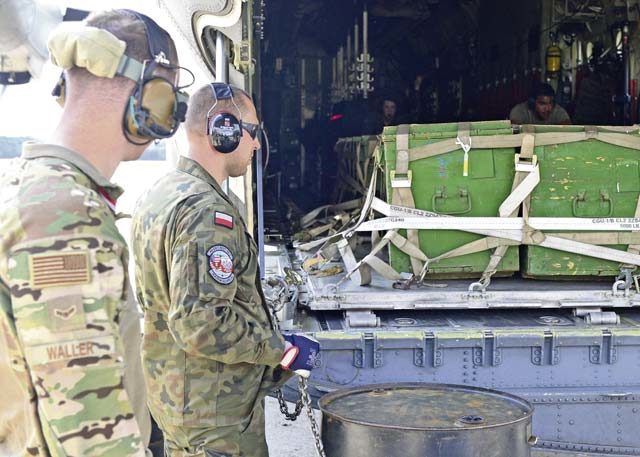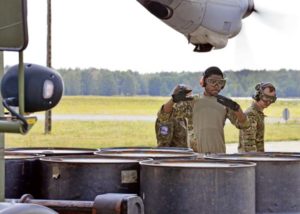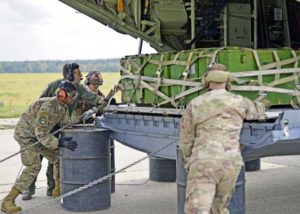Story and photos by
Staff Sgt. Jimmie D. Pike
86th Airlift Wing Public Affairs

POWIDZ AIR BASE, Poland — With aircraft engines roaring, Airmen are pushed by the wind and exhaust as they communicate through hand signals while performing a combat offload at the end of the taxiway.
During Aviation Rotation 19-3, a bilateral training exercise to improve joint functions between the U.S. and Polish militaries, members from the 435th Contingency Response Squadron worked to teach combat offload procedures at Powidz Air Base, Poland.
“We have two different types of combat offloads,” said U.S. Air Force Staff Sgt. Dylan Rymer, 435th CRS mobile aerial porter supervisor. “One is the combat offload alpha and the other is the combat offload bravo. Our goal is to show the Polish military how to perform the air transportation functions of these combat offload methods.”

While method alpha is as simple as unlocking a single pallet from the aircraft and taking off, allowing the pallet to slide onto the ground, method bravo is a little more challenging.
“Method bravo is where we take a multi-pallet train, pull it off of the plane and set it on barrels,” said Rymer. “We then break down the cargo on the taxiway before cleaning up. This is done in areas we don’t have operational aircraft loaders.”
When aircraft loaders are unavailable, other equipment such as forklifts can be used. In Poland, Airmen faced the challenge of having unfamiliar equipment.
“Their forklifts, loaders, and mobile handling equipment are a little bit different than ours,” said U.S. Air Force Senior Airman Kenneth Saunders, 435 CRS mobile aerial porter. “That’s something we had to adjust to when working with them.”
However, despite the challenges faced, personnel were able to successfully complete the offloads, with members of the Polish armed forces having learned something new.
“I’ve only been working with cargo here for a year,” said Marcin Zawadski, armed forces of Poland cargo loader. “I’ve worked with the U.S. twice, but this is my first time doing this combat offload and it is very interesting.”
According to Saunders, completing the offloads jointly between the U.S. and Poland have become very smooth, partially due to their desire to learn.
“Working with the Polish is amazing,” said Saunders. “Their English is really good, so communication goes well. Plus, they’re here ready to work and eager to learn.”

With skills on both sides being tested and improved upon, personnel are grateful for the opportunity to work together.
“I like working together with the U.S. because I always learn something new,” said Zawadzki. “It’s a nice experience and a lot of fun.”
Aviation Rotations in Poland happen quarterly to continue to build on past iterations of the exercise and create a stronger partnership between the U.S. and Polish forces.


